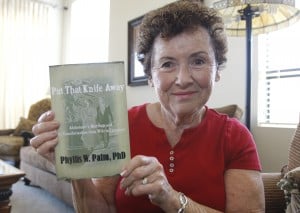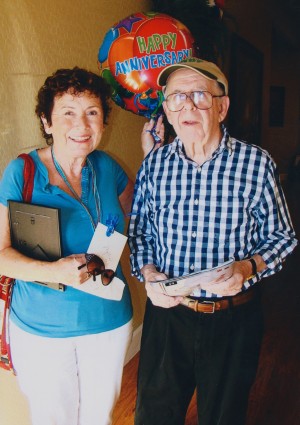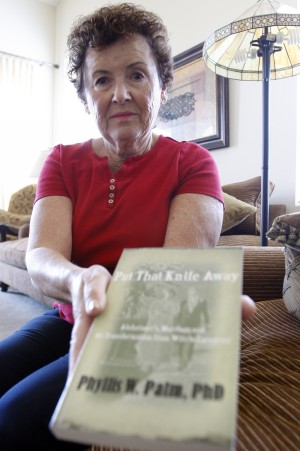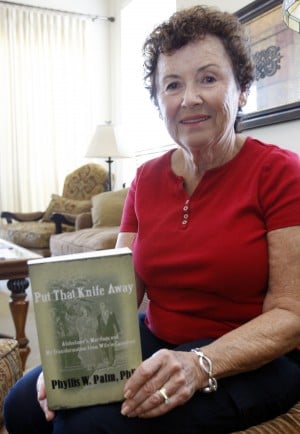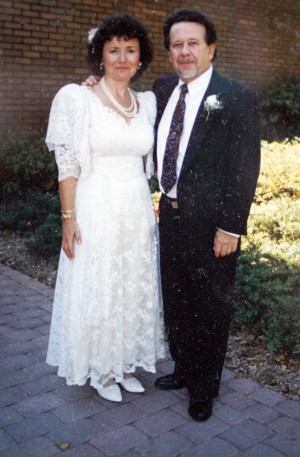In an increasingly digital world, aspiring authors have more options — and cheaper ones at that — for self publishing. But with self publishing also comes different challenges, said a new Mesa author.Phyllis Palm wrote “Put that Knife Away — Alzheimer’s, Marriage and My Transformation from Wife to Caregiver” after her husband’s Alzheimer’s diagnosis. It began as a diary in 2008, Palm said.“My attorney said I should keep track of all of the expenses on (my husband’s) behalf,” Palm said. “I started writing everything. And it became my sanity.”
Palm and her husband, both originally from the East Coast, had two homes, one in New York and another in Mesa, she said. It was during a summer in New York that she decided to take a writer’s course at a YMCA.
“By the end of the summer, I had eight chapters written,” Palm said.
With a little encouragement, Palm began to flush out her book with more chapters, including some details of other’s experiences with the disease.
“I’m still giving back,” Palm said, who retired from her psychology practice to take care of her husband. “I’m still participating in my field using the skills that I have.”
Palm also now volunteers as an Alzheimer’s support group coordinator. Dementia is like an umbrella, she said, and Alzheimer’s is just one spoke.
What makes her book different from so many other memoirs is her background and her intent, she said. She sees this topic becoming more important as the “Sandwich Generation” begins caring for their elderly parents while they also raise children.
“I can show caregivers are not alone, that those uncomfortable feelings are normal,” she said. “I can express myself about more challenging parts more candidly, especially things like sexual misbehavior. They can read about it and then feel more comfortable talking about it.”
In a chapter, Palm describes the title of her book, the last evening she cooked for her husband in their home.
“My husband was a sweet, kind man and he turned into an aggressive, angry one,” Palm said.
One night Palm was making dinner while her husband napped.
“You know how with kids when the house is too quiet? It was like that, only I thought he was napping, so I thought it was okay,” she said.
While she cut a roasted chicken, she heard Bob come up behind her and say, “Put that knife away. You’re scaring me.”
She put the knife down and turned. He brandished a bread knife in front of her face, she said.
“Because I have one too,” he said.
After wrapping it in a cloth napkin, he took it into his office and hid it among his things, Palm said.
“We played a lot of hide and seek,” Palm said describing how Bob would hide objects throughout the house. “But with a knife, I couldn’t.”
A little time later, she called her husband to dinner, hoping he had forgotten the incident.
“I’m not going to eat anything you cook,” he informed her.
“I knew then that I wasn’t going to be able to keep him at home,” Palm said.
She chose Amazon’s CreateSpace to publish her book, but publishing it was a challenge.
“The thing about self publishing — you get no help from nobody,” Palm said with a laugh.
Instead, the company charges for help from editing to cover design.
“My cousin Nora from Switzerland helped me with a lot with it,” she said.
Palm’s cousin and daughter, a graphic designer, designed the cover and helped upload the manuscript.
The first proof had problems with the pagination, while the second had a white trim around the cover photo and the writing on the spine was upside down, but the third proof was perfect, Palm said.
“With my cousin’s and daughter’s help, I had very few expenses until I had to get the ISBN number, and of course, ordering copies of the book,” Palm said.
The ISBN, or International Standard Book Number, is a 10 or 13 digit number used to identify books.
Marketing has been her biggest challenge, Palm said. She paid CreateSpace to write and distribute a press release, but with little result.
She then began speaking and promoting her book at community centers, adult care homes, churches and synagogues. While she has explored options with small distributors, most of the options involve investing money to get a larger return on her book.
So for now, she’s sticking to selling her book with a smaller budget. After all, she said, she’s not trying to make money, but help other people like herself.
For now, it means taking things slow and learning to adapt to the ever evolving relationship with her husband.
Bob doesn’t remember Phyllis’ name anymore, nor does he greet her with a big hug when he sees her, she said.
Leaving her husband in a residential care facility has been extremely difficult, Palm said.
“Pull — like that of a mother who is nursing a child,” she described. “I feel drawn to taking care of him, but at the same time, I know I can’t do it all.”
Recently, Bob saw a picture of the two of them and said, “That was a long time ago.”
The pictures of a past that he doesn’t remember don’t carry any sentimental value. Instead, he seemed to relax after the frame contained a more recent picture.
“We can still have positive moments,” Palm said, detailing trips to Bob’s new favorite restaurant, Village Inn, where he gets “real food” (also known as eggs, sausage, hash browns, and pancakes) and expeditions to Red Mountain Park. “These memories are my memories. Even though he won’t remember it, it can be a joyful time.”
Palm continues to write on her blog at
doctorphyl-heartofpalm.blogspot.com. You can also purchase her book at
www.phylliswpalm.com. It is also available as an e-book for Amazon Kindle and Barnes & Noble Nook.
